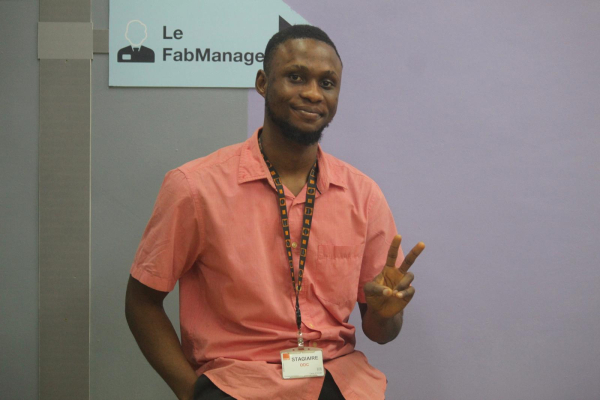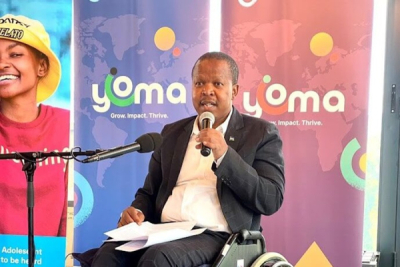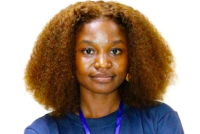-
Awahnji Jean Awah pursues a Master’s in Data Science and AI while completing extensive multi-vendor certifications across IBM, Meta, Google, AWS, Azure, Red Hat and others.
-
Orange Digital Center (ODC) trains him through its partnership with Coursera, signed in April 2024, offering hands-on programmes and continuous mentorship.
-
He applies his skills in freelance development and AI practice, gaining better-paid missions, higher responsibilities and increased client trust.
Cameroonian developer Awahnji Jean Awah builds digital solutions and moves toward cloud technologies and artificial intelligence. He pursues a Master’s degree in Data Science and Artificial Intelligence at the Institut universitaire de la Côte, where he acquires scientific and practical foundations in these fields.
Alongside his academic programme, he trains himself through web development, data-analysis projects and website creation for clients. This autonomous work allows him to test his skills against concrete business needs.
With the goal of becoming “an end-to-end AI engineer capable of designing high-impact digital solutions,” Awahnji joins the Orange Digital Center (ODC), Orange’s technology-training hub. He follows several programmes created through an April 2024 partnership between ODC and Coursera, which he discovered on social media.
He completes certifications from IBM (DevOps, Software Engineering, Machine Learning, AI Developer), Meta (Back-End and Front-End Developer), Google (UX, Data Analytics, Project Management), AWS (Cloud Architect), Microsoft Azure (Developer), Red Hat (Kubernetes/OpenShift), Microsoft (Project Management, Cloud Support), Scrum Master, and additional technical modules.
This training path, which began in July 2024 and continues throughout 2025, relies on an intensive schedule that combines practical workshops, ODC staff mentoring and professional simulations. In an interview with We Are Tech Africa, he describes the experience as “rich, practical, intuitive, well supervised by the ODC staff.”
In parallel, he works as a freelance developer and AI practitioner, a framework that allows him to apply his newly acquired skills. He says that the certifications have “strengthened my portfolio, improved my technical autonomy, increased my opportunities for freelance missions and enhanced my professional credibility.”
He states that they have transformed his “skills, strengthened my confidence and given me the tools needed to turn my ideas into real and impactful solutions.” He adds that this evolution results in “better-paid missions, more responsibilities and greater client trust.”
Looking ahead, Awahnji plans to “become a certified AI and cloud engineer, design impactful AI tools, develop scalable cloud solutions and, ultimately, create or join a technology start-up.”
This article was initially published in French by Melchior Koba
Adapted in English by Ange Jason Quenum
- Orange Sierra Leone inaugurated a €23 million ($26.7 million) backup datacenter in Bo.
- The company invested $50 million to modernise its network, now fully 4G- and 5G-compatible.
- Orange Sierra Leone controls 51% of the mobile market with 3.04 million subscribers.
Orange Sierra Leone continues to scale its network infrastructure as the market leader. The company recently announced that it invested $50 million to modernise its nationwide telecom network.
Orange Sierra Leone inaugurated a new datacenter on 29 November in the southern city of Bo. The company built the facility for €23 million ($26.7 million) as an identical replica of its main datacenter in Freetown. The operator says the new site will function as a disaster-recovery hub to prevent emergencies, outages or natural disasters from disrupting digital services across the country.
The company highlighted the strategic location of the site. “Strategically located in the south of the country, the new centre contributes to extending digital infrastructure to rural and regional communities, particularly in the southern and eastern corridors toward Makeni, Kono and Kenema. It will enable better distribution of network traffic and improve connectivity in underserved areas,” Orange said in a statement posted on Facebook on 30 November.
The operator built the datacenter as Freetown remains exposed to landslides such as the 2017 event and as the country continues to face recurrent flooding. The backup site aims to ensure service continuity if such disasters threaten the capital.
The inauguration aligns with Sierra Leone’s broader digital-transformation agenda. Telecom services now support daily activities for businesses, households and public administration. Communications Minister Salima Bah stressed the importance of uninterrupted service after a brief outage in August 2024. “The Internet has become an indispensable tool in our daily lives. If the connection were interrupted, everyone would realise how much we depend on it,” she said. She added that the government and telecom operators have made significant investments to prevent future disruptions.
Beyond the new datacenter, Orange Sierra Leone operates 616 telecom sites nationwide, including 40 recently deployed sites. The company powers 70% of those sites with green-energy sources. Orange also invested $50 million to modernise its entire network, which now supports full 4G and 5G capability.
The GSMA argues that these upgrades should strengthen Orange Sierra Leone’s competitive position. The organisation notes that “good quality of service can improve the digital experience and create new opportunities for individuals and the broader community.” By December 2024, Orange Sierra Leone reported 3.04 million mobile subscribers and a 51% market share in competition with Africell and QCell.
This article was initially published in French by Isaac K. Kassouwi
Adapted in English by Ange Jason Quenum
-
Youth unemployment in Lesotho reaches nearly 50% among 15–35-year-olds.
-
The government launched the YOMA digital platform with UNICEF to improve employability and access to skills.
-
Only 48% of the population uses the Internet, which threatens the programme’s adoption.
Lesotho faces one of the highest youth unemployment rates in Southern Africa, with nearly half of young people unable to find work. The government uses digital solutions to expand access to skills, boost employability and create new economic opportunities.
The Ministry of Gender, Youth and Social Development launched the Youth Agency Marketplace (YOMA) on 26 November in Maseru in partnership with UNICEF. The ministry says the platform aims to remove barriers that limit youth integration, including restricted access to training, digital skills and market opportunities.
YOMA operates as a pan-African digital platform that allows young people to acquire skills, receive mentorship and access economic opportunities. It offers pathways ranging from basic training to matchmaking with companies, NGOs and institutions. Users complete social or environmental “impact missions,” which reward them with digital tokens they can exchange for goods or services such as mobile credit or additional training.
The platform records all user activities in a verifiable digital CV, which increases the visibility and credibility of young jobseekers. YOMA aligns with international skills-development standards and uses a personalised approach. It adapts opportunities to each user’s profile, goals and potential while staying linked to labour-market demand.
Authorities say YOMA supports the government’s strategy to empower young people through accessible digital solutions. The stakes are high in a country where youth represent a large share of the unemployed. Official data estimate unemployment among 15–35-year-olds at nearly 50%, one of the highest ratios in the region.
Officials expect YOMA to improve employability, stimulate self-employment, facilitate access to certified training and generate income through paid missions. The platform also seeks to expand digital literacy in a country where young people still lack the tools to participate in a rapidly digitalising economy.
However, weak connectivity threatens uptake. DataReportal estimates that only 48% of Lesotho’s population used the Internet at the start of 2025, while mobile data costs remain high relative to average income. Rural areas face unstable mobile coverage, which limits access to a fully digital platform. YOMA’s success depends on stronger connectivity, lower access costs and broader awareness campaigns.
By launching in Lesotho, YOMA adds to deployments already underway since 2020 in Benin, Burundi, Côte d’Ivoire, Kenya, Nigeria and South Africa. The partnership with UNICEF allows Lesotho to rely on a tested model to broaden access to training, economic opportunities and entrepreneurship.
Samira Njoya
NBA Africa has selected ten startups from five countries for the second edition of its Triple-Double program, which supports young technology ventures in sports and the creative industries. The selected companies include Athlon Technology and Fitclan (Egypt), Novate and Reborn (Morocco), ProPath Sports and Safia Health (Kenya), and Contestify, Atsur and SongDis (Nigeria). They are scheduled to pitch their projects in Kigali on Friday, December 5.
Bolt, the ride-hailing platform, has reached a major milestone in South Africa, announcing it has completed more than 400 million trips since its launch in 2016. The service, which serves about 1.4 million passengers each month and has over 40,000 active drivers across twenty-three cities, hit this mark as the industry rolled out new safety rules requiring licenses, vehicle identification and physical alert buttons.
-
iFunza enables teachers to share real-time academic updates with parents via web and mobile platforms.
-
The app has surpassed 5,000 downloads on Android and targets both urban and rural families with low-data, low-spec features.
-
Schools use iFunza to reduce administrative costs and digitize communication and student-performance tracking.
iFunza aims to position itself as a new tool for academic support in Kenya. The application seeks to reinforce collaboration between teachers and parents to monitor student performance more efficiently.
The Kenyan edtech start-up developed iFunza as a web and mobile platform that allows teachers to share grades, assignments and observations in real time. Parents can access their children’s academic records instantly, regardless of their location.
Caroline Ndiangui and Martin Kariithi launched iFunza in 2019. The application operates on iOS and Android and has recorded more than 5,000 downloads on Play Store.
The app streamlines communication between schools and households. Automatic notifications inform parents of homework, absences or lateness, while teachers can send personalized messages to highlight academic challenges or congratulate progress. A centralized dashboard provides a clear view of student development, which enables faster and more tailored academic support.
iFunza works on low-spec smartphones and consumes limited data. The design targets families in both urban centers and rural areas. In a country where personal computer ownership remains limited, iFunza offers an accessible alternative that aligns with Kenya’s digital reality.
The platform helps schools reduce administrative expenses linked to manual report cards, parent notices or communication management. iFunza digitizes school administration and rationalizes pedagogical monitoring by making information accessible online, rapidly and securely.
In a context where education outcomes and student monitoring are major development priorities, iFunza can help improve academic achievement, strengthen accountability among parents, teachers and learners, and foster continuous dialogue around learning.
This article was initially published in French by Adoni Conrad Quenum
Adapted in English by Ange Jason Quenum
-
The Interior Ministry launched a national digital platform allowing Algerians to file online declarations for lost, stolen or destroyed official documents and obtain certified electronic attestations.
-
The police recorded 1.3 million loss declarations in 2024 and an additional 1.5 million in 2025, pushing authorities to adopt a digital system capable of managing surging demand.
-
The initiative forms part of Algeria’s plan to raise the digital sector’s GDP contribution to 20% by 2030 through online public services and technological modernization.
Algeria moves decisively toward digital transformation as it aims to increase the sector’s contribution to GDP and modernize public services by 2030. Authorities place the rollout of new electronic platforms at the center of this strategy.
Interior Minister Saïd Sayoud officially launched on 27 November in Algiers the national digital platform for declarations of lost documents. Authorities present the system as a key component of the state’s digital transformation agenda that seeks to modernize procedures, ease administrative burdens for citizens and improve the efficiency of public security services.
Engineers at the General Directorate of National Security (DGSN) developed the platform. The system allows any citizen to declare online the loss, theft or destruction of an official document — including identity cards, passports or driving licenses — and to immediately obtain a certified electronic attestation.
The platform remains accessible 24/7 via the police website. It manages data entry and request tracking, integrates automated verification mechanisms to curb abuses and builds a centralized database to identify multiple declarations. Developers designed the system to improve access for people with special needs and residents in remote areas.
The DGSN states that the platform responds to a real operational need. Authorities recorded 1.3 million declarations of loss in 2024 and another 1.5 million since the start of 2025. This growing volume justifies the shift toward a digital system that can streamline procedures, shorten processing times and reduce the administrative workload on police services.
This innovation aligns with Algeria’s broader digital transformation strategy promoted at the highest level of the state. The government aims to raise the digital sector’s contribution to 20% of GDP. The objective depends on expanding online public services, modernizing technical infrastructure and supporting local innovation.
Officials view the new platform as a continuation of reforms already underway, including the introduction of biometric driving permits, digital vehicle registration cards and new secure DGSN services.
Beyond efficiency gains, authorities expect the platform to improve administrative accessibility for remote or vulnerable populations. The tool enables citizens to complete procedures remotely, reduce travel needs and limit printing-related costs.
However, several challenges remain for the reform to deliver its full impact. The government must protect personal data, ensure the reliability of verification systems to prevent fraud, educate citizens on digital tools and maintain sustained technical and institutional support.
This article was initially published in French by Samira Njoya
Adapted in English by Ange Jason Quenum
-
Dashy integrates the entire sales cycle — from chat to payment — inside WhatsApp through a unified dashboard launched in 2024.
-
The platform’s Pay-by-Link and SoftPOS features allow businesses to collect payments directly inside WhatsApp conversations or via smartphone terminals.
-
Dashy automates customer interactions with AI-driven workflows, routing, catalog synchronization and transaction monitoring.
Imad Moujahid repurposes WhatsApp from a messaging tool into a structured commercial channel. He creates an integrated space where each exchange between clients and companies can lead directly to a transaction.
Imad Moujahid is a Moroccan entrepreneur active in digital payments and transaction automation. He serves as CEO of Dashy, a platform he founded in 2024 that turns WhatsApp into a space for sales, customer support and payments. The tool consolidates every step of the commercial cycle into a single dashboard to match the platform’s massive adoption across daily communication.
Dashy centralizes all customer conversations and links them to operational workflows. Businesses manage clients, product catalogs, orders and payments without switching between interfaces. The system groups all exchanges into one inbox that supports message assignment, internal note-taking and full interaction histories. The platform aims to ensure companies process all requests and avoid unresolved discussions.
Payments anchor Dashy’s system. The Pay by Link feature generates a secure payment link sent directly inside a WhatsApp chat. Clients complete payments without additional apps or devices. For in-person transactions, Dashy offers a SoftPOS feature that turns a phone into a payment terminal, which reduces the steps between purchase intent and completed transaction.
The platform also operates as a connected back-office. Companies create or import product catalogs and synchronize them with order tracking. Dashy automates the delivery of information to clients, even during peak periods. The Flow Builder enables businesses to design AI-powered conversational scenarios that answer frequent questions, qualify prospects and deliver first-level assistance at any time. Automated payment reminders, scheduled alerts and skill-based conversation routing complete the ecosystem.
Beyond messaging and payment, Dashy aims to serve as a full commercial back-office linked to WhatsApp. Companies can create or update product catalogs from existing systems or directly inside the platform, then follow orders and automate customer updates throughout busy periods.
Before launching Dashy, Moujahid co-founded and led Finacsys, a provider of credit-management software. He also serves as an associate director at Capdev, a banking-technology consulting firm. He holds a computer engineering degree from Morocco’s École Nationale Supérieure d’Informatique et d’Analyse des Systèmes (ENSIAS).
Moujahid began his career in 2008 as an IT consultant at Veneta Digital Systems. Between 2010 and 2014, he worked as a business consultant for several banks in the Attijariwafa Bank Group, including operations in Gabon, Cameroon and the Republic of Congo.
This article was initially published in French by Melchior Koba
Adapted in English by Ange Jason Quenum
-
Laitify, founded in 2024, deploys sensors, a unified dashboard and QR-code traceability to optimize dairy production from farm to distribution.
-
The system uses real-time data on animal health, milk volume and geolocation to help farmers manage their herds and forecast supply.
-
Laitify integrates AI analytics to generate recommendations on herd management, productivity gains and commercial planning.
Togo positions digital technology as a driver of efficiency in the dairy sector as producers seek tools that structure the journey of milk from breeding to distribution. Medede Bidassa proposes a digital method that documents each step and helps farmers manage their operations more effectively.
Medede Bidassa works as a tech entrepreneur in Togo with the goal of placing digital tools at the service of dairy producers. She co-founded Laitify and serves as its CEO. The company designs technological solutions that improve farm management and strengthen control over dairy production.
Laitify, founded in 2024, deploys a platform that transforms dairy practices from breeding to distribution. The system uses sensors that track in real time the health of cattle, the volume of milk produced and the animals’ geolocation.
The platform consolidates all data on a central dashboard. It displays key indicators for each farm, including production statistics, sales performance and operational metrics.
Laitify also integrates a QR-code traceability system. The tool records each batch of milk into a single database, which facilitates stock control, supply planning and access to production history.
This digital organization enables producers to anticipate their needs, secure the production chain and reduce inefficiencies.
The platform embeds an AI engine that analyzes collected data and generates recommendations. These insights support decisions related to herd management, productivity improvements and commercial planning.
In parallel, Bidassa co-founded Amazing Girls on Tech in 2024, a training program for young women interested in technology careers. She leads its technical training division. She also manages the online community of Tech Communities Day, an initiative dedicated to technology dynamics and collaborative innovation.
Bidassa holds a certification in computing and Internet technologies from the FORCE-N program in Senegal. She currently works as a freelance web developer and serves as team lead for the Google Developers Group in Lomé.
This article was initially published in French by Melchior Koba
Adapted in English by Ange Jason Quenum
-
E-Doc Online, founded in 2021, provides an open-banking data gateway that connects— with user consent— to bank accounts and transaction histories in real time.
-
The company’s API automates identity verification, credit decisions and compliance, using AI and large language models to classify unstructured banking data.
-
The system aims to strengthen risk scoring, reduce document fraud and accelerate onboarding and lending for B2B financial institutions.
Tunde Ogundipe links banking data to risk evaluation and reshapes how financial actors operate. He redefines the use of information in credit decisions and the monitoring of financial services.
Tunde Ogundipe is a Nigerian financier and entrepreneur. He co-founded E-Doc Online and serves as its CEO. The UK-based company specializes in accessing and structuring financial data. It operates in Nigeria and provides a banking-data gateway for B2B institutions.
E-Doc Online, founded in 2021, develops data infrastructure based on open-banking principles. The technology connects— with user consent— to customers’ bank accounts and transaction histories. The platform then structures the data and delivers it to financial institutions and enterprises that need stronger customer insights and real-time risk evaluation.
The platform relies on an application programming interface (API) that automates identity verification and credit decisions. The API collects user consent, pulls real-time banking data and transmits it in a usable format to partner systems.
The system integrates artificial-intelligence models, including large language models that analyze transaction descriptions. These models interpret and classify unstructured data. The method strengthens risk-score accuracy, reduces attempts at document falsification and accelerates onboarding, loan approvals and compliance checks.
Before founding E-Doc Online, Ogundipe launched Kolobox in 2018. The application enables users to invest savings through a digital wallet funded automatically from a debit card at a defined frequency to help them meet financial goals.
Ogundipe holds a bachelor’s degree in accounting from Kennesaw State University in the United States and a management diploma obtained in 2006 from the Georgia Institute of Technology. He started his career in 2001 at Cingular as a senior IT accountant.
He joined Verizon in 2003 as a financial analyst. He later worked as a business analyst at Metro Bank in London from 2016 to 2019, and as an analyst at Bank of America Merrill Lynch in Ireland between 2020 and 2024.
This article was initially published in French by Melchior Koba
Adapted in English by Ange Jason Quenum
More...
- Strategy targets curriculum reform, teacher skills, infrastructure and online learning tools
- Strategy aligns with SDG 4 and aims to boost youth employment and digital readiness
Guinea has approved its National Strategy for the Digital Transformation of Technical and Vocational Education and Training. The 300 billion Guinean franc (34.5 million dollar) plan was adopted at a workshop in Conakry hosted by the Ministry of Technical Education and Vocational Training. It aims to modernize the country’s technical and vocational training system.
The strategy is aligned with the Sustainable Development Goals, particularly SDG 4 on quality education. It seeks to make technical education a key driver of employment and entrepreneurship. Its priorities include updating training programs, adapting curricula to labor market needs, improving digital infrastructure and connectivity, and closing the skills gap among teachers.
According to the ministry, the funding will be used to strengthen digital infrastructure, equip training institutions, train teachers and deploy online learning platforms. The plan forms part of Guinea’s 2035 development vision, which aims to build a strong digital ecosystem that can support technical education over the long term. Regionally, Guinea is contributing to a pan-African initiative to digitize technical education in order to align approaches and share funding and expertise across countries.
The approval comes as Africa’s labor market is rapidly changing with rising demand for digital skills. The Brookings Institution’s report “Foresight Africa 2025-2030” estimates that 230 million jobs in sub-Saharan Africa will require digital competencies by 2030. It also anticipates up to 650 million training opportunities, which represent a potential market of 130 billion dollars.
The successful implementation of Guinea’s strategy will depend on several factors. These include securing the necessary funding, strengthening governance, improving teacher training in digital tools and ensuring the availability of essential infrastructure such as reliable electricity and high-speed internet in rural areas.
If fully implemented, the strategy could expand access to professional training, modernize technical programs, increase youth employability and strengthen the country’s competitiveness in a rapidly digitalizing economy. Youth unemployment remains particularly high in Guinea and is estimated at nearly 60 percent according to national statistics.
Samira Njoya
- Government launches a 2025–2029 national child online protection strategy with a $1.8 million budget.
- UNICEF and GSMA created the Africa Taskforce on Child Online Protection in October 2025 to harmonize continental standards.
- Zambia joins Nigeria and Ghana, which already adopted national policies on child cybersecurity.
Zambia has introduced a national strategy to protect children online as digital adoption accelerates amo
ng the country’s youth. The government aims to ensure safer and more responsible Internet access for minors.
The government launched the National Child Online Protection Strategy (2025–2029) on Monday, November 24. The document sets a roadmap to strengthen digital safety for children nationwide and to build a safer online environment for young users.
The government allocated $1.8 million to this plan. The strategy focuses on several pillars, including strengthened national policy coordination, development of digital skills, awareness programs for children and parents, and a structured collaboration framework connecting public, private and civil society stakeholders.
This initiative comes as Internet penetration grows quickly across Africa, especially among younger populations. UNICEF reports that African children rank among the fastest-growing digital user groups worldwide, which increases their exposure to cyberbullying, misinformation, online exploitation and harmful content.
These risks prompted UNICEF and GSMA in October 2025 to launch the Africa Taskforce on Child Online Protection (COP). The platform aims to harmonize protection efforts, deepen cooperation among states and promote shared digital safety standards across the continent.
In Zambia, recent national data on children’s Internet use remains limited. Authorities, however, recognize a steady rise in youth connectivity, which makes preventive, educational and regulatory measures urgent.
With this strategy, Zambia joins other African countries that have already implemented structured national child online safety policies. Nigeria and Ghana in recent years adopted legal frameworks and government programs dedicated to child cybersecurity.
If fully implemented, Zambia’s strategy could reduce minors’ exposure to digital risks and strengthen trust among families and schools in the use of online tools. Its success, however, will also depend on the development of an adapted legislative framework to ensure a safe, inclusive and protective digital environment for children.
Samira Njoya
- Edomatch records more than 50,000 downloads on Android.
- The start-up launched the platform in 2024 in Lomé.
- The app enables direct job applications and employer preselection through a single mobile interface.
Edomatch disrupts traditional recruitment in Togo by offering employers and job seekers a mobile platform designed to simplify hiring. The application aims to provide a fast, accessible and low-cost solution for both sides of the labor market.
Edomatch is a digital tool that allows any job seeker—whether full-time, part-time or for temporary assignments—to apply online through its website or mobile app. The Lomé-based start-up launched the service in 2024 under the leadership of founder Chris Koehler.
“Our mission is to simplify and humanize the job search while helping companies find talent efficiently,” the start-up states. The application runs on iOS and Android, and it has already surpassed 50,000 downloads on the Play Store.
The platform enables users to create profiles, review available offers and apply in a few clicks. Companies can publish job postings and preselect candidates directly from the app. This structure reduces administrative steps and accelerates recruitment processes.
Edomatch differentiates itself through its broad sector coverage, which includes commerce, logistics, services, construction and hospitality. The app uses geolocation tools that allow candidates to identify job postings near their homes. This feature supports local employability and reduces unnecessary travel.
The platform also facilitates professional integration for young people, inexperienced candidates and individuals from disadvantaged backgrounds. For companies, the application reduces time and resource costs by eliminating the need to publish across multiple channels, sort large volumes of CVs or rely on expensive intermediaries. Firms can quickly identify relevant profiles and access candidates available for immediate hire.
By combining an accessible mobile interface, a large pool of job listings and an inclusive orientation, Edomatch has the potential to transform Togo’s labor market. In an economy marked by informality and high unemployment, the platform could become a key tool for professional integration by making recruitment more transparent, efficient and equitable.
This article was initially published in French by Adoni Conrad Quenum
Adapted in English by Ange Jason Quenum
- Bluworks raises $1 million to expand in the Middle East and North Africa.
- The platform centralizes scheduling, attendance, administration and payroll into one system.
- Founder Hussein Wahdan previously held senior planning and performance roles at Jumia Egypt.
Hussein Wahdan targets a sensitive operational challenge inside companies: team organization and the management of employee-related data. His solution aims to meet a growing demand for structure and visibility in workforce administration.
Wahdan is an Egyptian tech entrepreneur and the chief executive of Bluworks, a human-resources technology start-up he founded in 2022 with COO Farah Osman. The company recently raised $1 million to scale across the Middle East and North Africa.
Bluworks operates an online platform that manages HR functions for organizations with large workforces or variable schedules. The tool unifies scheduling, attendance tracking, administrative management and payroll processing in one environment. The company intends to reduce manual workloads and centralize all employee-related data.
The scheduling function enables managers to create and adjust team timetables and to share them without external spreadsheets or scattered updates. The system updates schedules in real time, which limits gaps between instructions and on-site execution.
The real-time attendance module shows who is working, who is missing and who arrives outside expected hours. The platform uses these data points to calculate hours, leave and payroll. The leave module automates requests, approvals and validation workflows, which gives managers a consolidated view of available staff.
The platform also includes a system for bonuses and penalties and a digital HR file for each employee. These tools aim to structure information, avoid double entries and improve operational clarity. The payroll engine connects to all other modules and automatically calculates monthly salaries using recorded data.
Wahdan’s professional path informs Bluworks’ direction. He earned an economics degree in 2010 from the American University in Cairo and an MBA in 2018 from IE Business School in Spain.
He began his career in 2010 as a corporate banking associate at CIB Egypt before joining Jumia Egypt from 2018 to 2022. He first worked as a business planning manager and later became head of planning and performance in 2020.
This article was initially published in French by Melchior Koba
Adapted in English by Ange Jason Quenum















